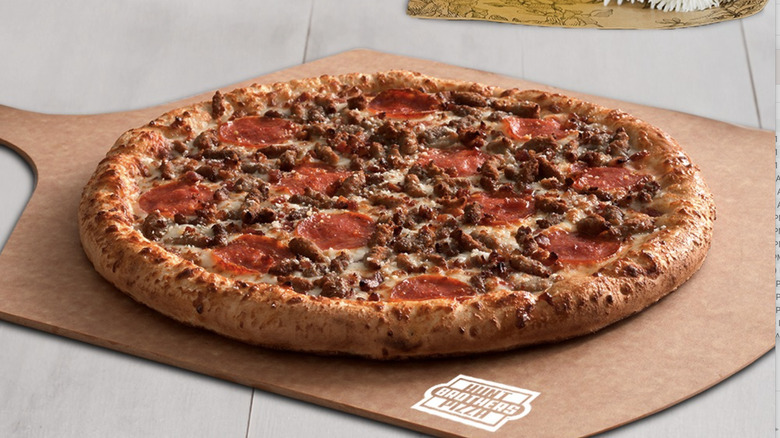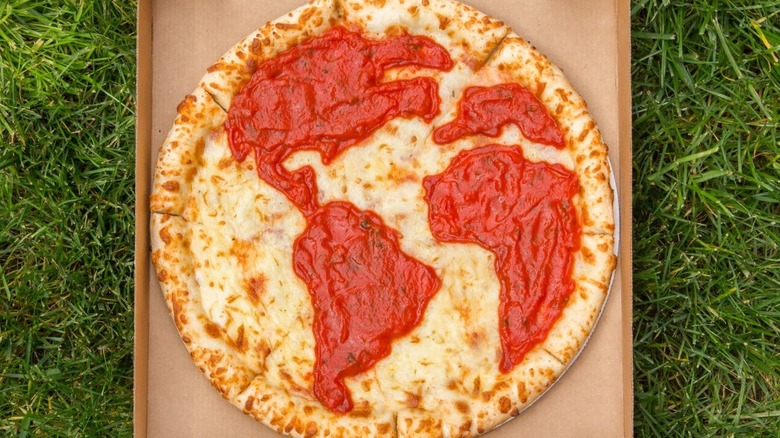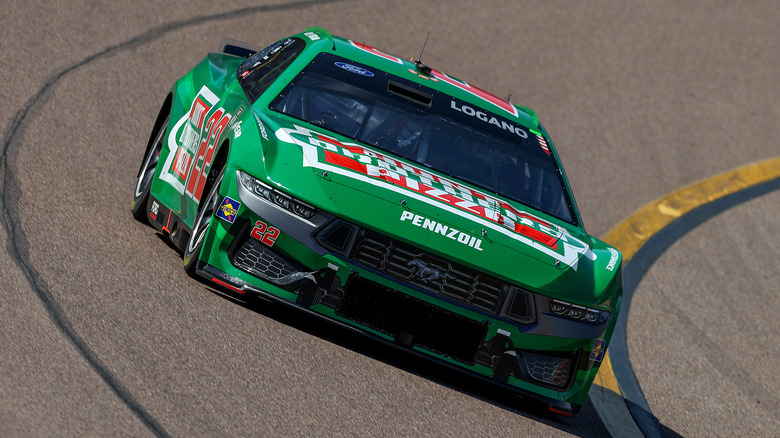The Pizza Chain You Had No Idea Was The Biggest In The US
When you think of chain pizza places in the United States, there are a few big names that immediately spring to mind. Maybe you thought of the storied history of Domino's Pizza, the chain that invented the 30-minutes-or-less pizza delivery guarantee. Or maybe Pizza Hut, whose name was created out of convenience, is what came to mind. Papa John's, Little Caesars, or even Sbarro might've come up. Heck, maybe you're even a pizza hipster and you thought of Shakey's Pizza, the first pizza chain in America.
None of these, though, are the biggest pizza chain in the country by total number of locations — nor are any of them particularly close. Though Domino's and Pizza Hut wage war over positions two and three as the biggest name in chain pizza with nearly 7,000 spots each, another company vastly outpaces them with around 9,700 locations: Hunt Brothers Pizza. What's more, the company has done it by eschewing every rule its direct competitors espouse, making it easier for franchisees to get in on the game, and spreading their product's availability through the use of gas stations and convenience stores.
Hunt Brothers targets underserved markets
Hunt Brothers does share one thing in common with its direct competitors Pizza Hut (Wichita, Kansas) and Domino's (Ypsilanti, Michigan): Its roots are in the Midwest. In 1962, Evansville, Indiana siblings Don, Lonnie, Jim, and Charlie Hunt founded a wholesale chain called Pepe's Pizza that sold its pies to places like bowling alleys, drive-in movie theaters, and restaurants. Though the brothers eventually sold the original business in 1981, they came back together to form a new chain a decade later: Hunt Brothers, based in Nashville, Tennessee. But its route to success from there was wildly unlike that of any of its industry competitors.
Hunt Brothers, alone among its peers, doesn't build free-standing locations. Instead, it sets out to take advantage of existing architecture, putting pizza counters in existing gas stations and convenience stores across the South and Midwest, particularly in rural areas underserved by other chains. Its business arrangement is unusual: To take advantage of what's already there, it offers initial equipment for rock bottom prices (something around $10,000) to these businesses, allowing those stores to seamlessly begin cooking and selling pre-made frozen pizzas right alongside its fishing bait and gasoline.
Hunt Brothers has a unique business model
The most amazing thing about Hunt Brothers, though, is that it dodges the trappings that are wildly lucrative for the parent company but that tend to make franchisees go belly-up. Hunt Brothers doesn't charge any franchising, advertising, or royalty fees, essentially unheard of in the industry; they sell ingredients to their franchises, but that's it. Hunt Brothers also doesn't require a contract; operators can drop out at any time. And it doesn't oversaturate the market; each location that sells Hunt Brothers has its own protected territory. Contrast this with, say, Subway (which has no protected territory, the biggest reason many of its franchises fail), and you start to see how Hunt Brothers has carved out a unique niche for itself.
Technically, Hunt Brothers still isn't national; it's only available in 32 states and currently doesn't operate in New England or anywhere west of the Rocky Mountains. The fact that it's able to have so many locations without appearing from coast to coast is due to the clever marketing and targeted business approach of its founders, who have aligned themselves with Southern culture, becoming heavily involved with NASCAR and even sponsoring a high-profile team and multiple cup-winning drivers.
Hunt Brothers may not have the broad profit numbers of some of its larger competitors like Domino's and Pizza Hut, but it operates a business model that is remarkably low-risk and steadily dependable. More companies could stand to learn from that idea.


